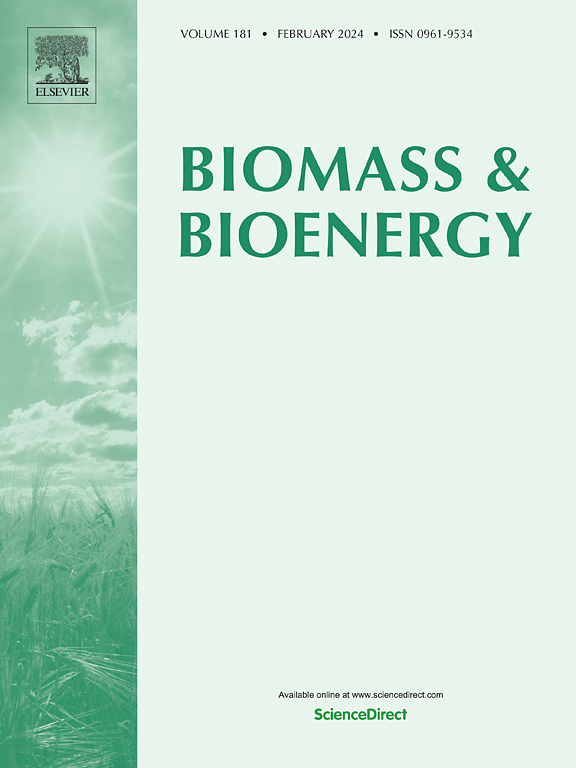Comparative evaluation of biomass and waste gasification in fixed and fluidized beds: Influence of operating conditions on syngas quality and energy viability
IF 5.8
2区 生物学
Q1 AGRICULTURAL ENGINEERING
引用次数: 0
Abstract
This study evaluates the gasification of pine, olive pomace (OP), and refuse-derived fuel (RDF) in bubbling fluidized bed and fixed-bed gasifiers under varying conditions. Experiments were conducted at 700–800 °C with equivalence ratios (ER) of 0.18–0.34. For pine, H2 reached 13.75 % at 800 °C, with an LHV of 5.71 MJ/Nm3 and CGE decreasing from 68.18 % (700 °C) to 50.11 % (800 °C). OP showed higher CGE (65.09 % at 700 °C) but faced persistent tar challenges, with tar content exceeding 9 g/Nm3 even at 800 °C. RDF exhibited the highest tar production (28–30 g/Nm3) and lowest CGE (28.53 % at 800 °C), attributed to its heterogeneous composition and high ash content. Pine achieved the highest syngas flow rate (154.6 Nm3/h at 800 °C), compared to RDF (136.1 Nm3/h). These findings underscore the impact of feedstock properties and operating parameters on gasification performance, emphasizing the need for tailored strategies to optimize syngas quality and reduce by-products like tar.
固定床和流化床生物质和废物气化的比较评价:操作条件对合成气质量和能源可行性的影响
本研究评估了不同条件下在鼓泡流化床和固定床气化炉中松树、橄榄渣(OP)和垃圾衍生燃料(RDF)的气化。实验温度为700 ~ 800℃,等效比(ER)为0.18 ~ 0.34。800℃时,松木H2达到13.75%,LHV为5.71 MJ/Nm3, CGE从68.18%(700℃)降至50.11%(800℃)。在700°C时,OP表现出较高的CGE(65.09%),但面临持续的焦油挑战,即使在800°C时,焦油含量也超过9 g/Nm3。RDF表现出最高的焦油产量(28-30 g/Nm3)和最低的CGE(在800°C时28.53%),这是由于其不均匀的组成和高灰分含量。与RDF (136.1 Nm3/h)相比,Pine的合成气流速最高(800°C时为154.6 Nm3/h)。这些发现强调了原料特性和操作参数对气化性能的影响,强调需要定制策略来优化合成气质量并减少焦油等副产品。
本文章由计算机程序翻译,如有差异,请以英文原文为准。
求助全文
约1分钟内获得全文
求助全文
来源期刊

Biomass & Bioenergy
工程技术-能源与燃料
CiteScore
11.50
自引率
3.30%
发文量
258
审稿时长
60 days
期刊介绍:
Biomass & Bioenergy is an international journal publishing original research papers and short communications, review articles and case studies on biological resources, chemical and biological processes, and biomass products for new renewable sources of energy and materials.
The scope of the journal extends to the environmental, management and economic aspects of biomass and bioenergy.
Key areas covered by the journal:
• Biomass: sources, energy crop production processes, genetic improvements, composition. Please note that research on these biomass subjects must be linked directly to bioenergy generation.
• Biological Residues: residues/rests from agricultural production, forestry and plantations (palm, sugar etc), processing industries, and municipal sources (MSW). Papers on the use of biomass residues through innovative processes/technological novelty and/or consideration of feedstock/system sustainability (or unsustainability) are welcomed. However waste treatment processes and pollution control or mitigation which are only tangentially related to bioenergy are not in the scope of the journal, as they are more suited to publications in the environmental arena. Papers that describe conventional waste streams (ie well described in existing literature) that do not empirically address ''new'' added value from the process are not suitable for submission to the journal.
• Bioenergy Processes: fermentations, thermochemical conversions, liquid and gaseous fuels, and petrochemical substitutes
• Bioenergy Utilization: direct combustion, gasification, electricity production, chemical processes, and by-product remediation
• Biomass and the Environment: carbon cycle, the net energy efficiency of bioenergy systems, assessment of sustainability, and biodiversity issues.
 求助内容:
求助内容: 应助结果提醒方式:
应助结果提醒方式:


